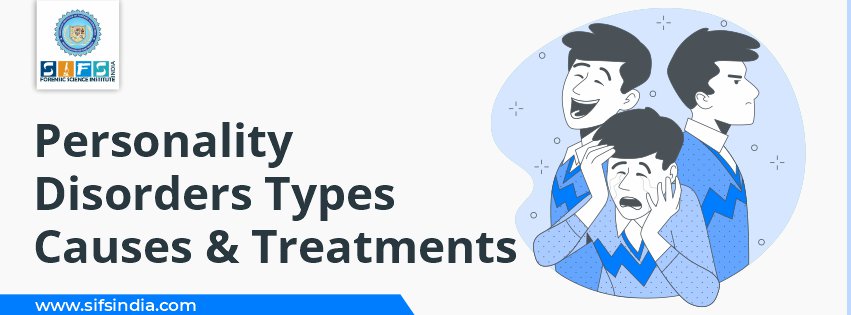- Call Us: +91 7303913002
- Email Us: education@sifs.in
Personality Disorders Types | Causes | Treatments

BY SIFS India | August 03, 2022
Personality Disorders Types | Causes | Treatments
A personality disorder is a mental disorder in which the patients experience abnormal and stubborn thinking and feeling patterns. They behave in an unusual way that is against the norms set by society.
Also, several times people suffering from mental disorders do not realize they are ill. Their thinking and behavior patterns are natural; instead, they blame others for their problems.
They find it difficult to cope with everyday situations or participate in social gatherings.
This unusual attitude causes relationship problems leading to social isolation, anxiety, and depression.
Causes of Personality Disorders
The exact cause behind the occurrence of mental disorders is not known. However, a few factors tend to intensify the development of personality disorders, like a family history of mental disorders and abusive life during childhood.
These disorders can be cured with the help of medication and talk therapy.
We all know personality is an outcome of a person’s thoughts and behavior. It is a way he understands himself and views the outside world.
The major part of the personality is formed during childhood and is dominated by two factors:
Genes: A person might acquire a few personality traits from parents through inherited genes.
Environment: It involves the effect of events, relationships with parents and other family members, and surroundings.
So, personality disorder results from a combined effect of genetic and environmental conditions. A person becomes susceptible to a disorder because of genes, and a life event acts as a catalyst leading to the development of the mental illness.
Different Types of Personality Disorders
Personality disorders can be grouped into three clusters based on the similarity in characteristics and symptoms. Also, sometimes a person might have multiple personality disorders simultaneously.
Cluster A: Suspicious
Paranoid: A person with this personality disorder often finds it difficult to trust others and is always suspicious of their intentions.
Schizoid: A person with this personality disorder shows very little interest in developing personal relationships or social bonds and is perceived as emotionally cold by others.
Schizotypal: A person with this personality disorder has an illusion to influence others with his thoughts and cannot interpret others’ thoughts and behavior, leading to inappropriate responses.
Cluster B: Emotional and Impulsive
Antisocial: A person with this personality disorder can indulge in activities like lying and stealing to manipulate others. Also, he has no regret for his dishonest actions and might be addicted to consuming alcohol and drugs.
Borderline: A person with this personality disorder often feels isolated and lonely despite family and societal support. He cannot deal with stress, thereby indulging in impulsive behavioral activities like heavy drinking and gambling.
Histrionic: A person with this personality disorder behaves dramatically to gain attention. He is sensitive to criticism and gets influenced by other people easily.
Narcissistic: A person with this personality disorder always thinks high of himself compared to others. He constantly boasts about his achievements exaggeratedly. He seldom understands other people’s feelings and is obsessed with self-admiration.
Cluster C: Anxious
Avoidant: A person with this personality disorder feels inferior and failed. He abides by others’ opinions and is hesitant to make new friends or participate in new activities.
Dependent: A person with this personality disorder depends on other people's opinions before making decisions. He finds it difficult to be independent and is ready to tolerate physical and verbal abuse to meet his physical and emotional needs.
Obsessive-compulsive: A person with this personality disorder wants everything to be perfect and feels irritated if perfection is not achieved. He strictly follows the rules and regulations and can go to any extent to make the work perfect.
Personality Disorder Treatment
Treatment depends on the kind and complexity of a person's personality disorder. It is usually a combination of medication and psychotherapy.
Psychotherapy or Talk Therapy
It involves a discussion between the therapist and the person with a personality disorder. The person can share his thoughts, feelings, and mental condition. It gives insights to the therapist about the symptoms and helps conclude the kind of disorder the person has.
There are several types of psychotherapy. Individual and group sessions might teach people how to cope with stress and change negative thinking patterns.
Medication
There are no specific medications present. However, a few medicines might be prescribed that help to reduce personality disorder symptoms, like:
Antidepressants: Helps control depression and impulsiveness.
Mood Stabilizers: Helps control aggression and severe mood fluctuations.
Antipsychotic Medications (Neuroleptics): Helps minimize psychosis indicators like hallucinations.
Anti-anxiety Medications: Helps reduce sleeplessness and anxiety.
Final Words
Various types of personality disorders and possible treatments are available to reduce their effect. However, the essential factor here is to diagnose the illness in the early stages. Once the mental disorder is recognized, it becomes easy to seek treatment.
You must try a few different treatments to check which one is the best before sticking to one type of treatment.
